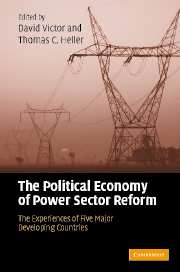Book contents
- Frontmatter
- Contents
- List of figures
- List of tables
- Notes on contributors
- Preface
- 1 Introduction and overview
- 2 Political economy of the Brazilian power industry reform
- 3 Reform of the Chinese electric power market: economics and institutions
- 4 The political economy of Indian power sector reforms
- 5 The Mexican Electricity Sector: economic, legal and political issues
- 6 The political economy of power sector reform in South Africa
- 7 Major conclusions: the political economy of power sector reform in five developing countries
- Bibliography
- Index
2 - Political economy of the Brazilian power industry reform
Published online by Cambridge University Press: 22 September 2009
- Frontmatter
- Contents
- List of figures
- List of tables
- Notes on contributors
- Preface
- 1 Introduction and overview
- 2 Political economy of the Brazilian power industry reform
- 3 Reform of the Chinese electric power market: economics and institutions
- 4 The political economy of Indian power sector reforms
- 5 The Mexican Electricity Sector: economic, legal and political issues
- 6 The political economy of power sector reform in South Africa
- 7 Major conclusions: the political economy of power sector reform in five developing countries
- Bibliography
- Index
Summary
Introduction
After a long period of rapid growth the Brazilian power industry entered a period of stagnation and crisis in the 1980s. Ever since the 1930s a series of tariff rules and nationalizations had squeezed private investors from the market. In their place, state enterprises had assumed the function of distributing electricity in Brazil's twenty-six states; Eletrobras, owned by the central government, managed the transmission system and also generated much of the electricity in Brazil. Through its control over state funds for building power plants, Eletrobras pursued vast projects such as the Itaipu hydroelectric plant and assured low electricity prices as part of the government's policy of import substitution. In the shock of the oil crises and the Latin American debt crisis this system unraveled. Financing costs escalated yet tariffs were kept low; losses mounted.
The process of reforming the electric power system began after the new democratic government took power in 1990. But a more radical effort at reform arose only in the mid-1990s in response to two main pressures. One was the goal of reorienting the entire economy away from the import substitution policies towards a more competitive system that promised greater investment and economic growth (Diniz, 2003). As a first step the finance ministry induced several states to sell valuable electric assets to private investors and plug gaping holes in their balance sheets.
- Type
- Chapter
- Information
- The Political Economy of Power Sector ReformThe Experiences of Five Major Developing Countries, pp. 31 - 75Publisher: Cambridge University PressPrint publication year: 2007
- 10
- Cited by



